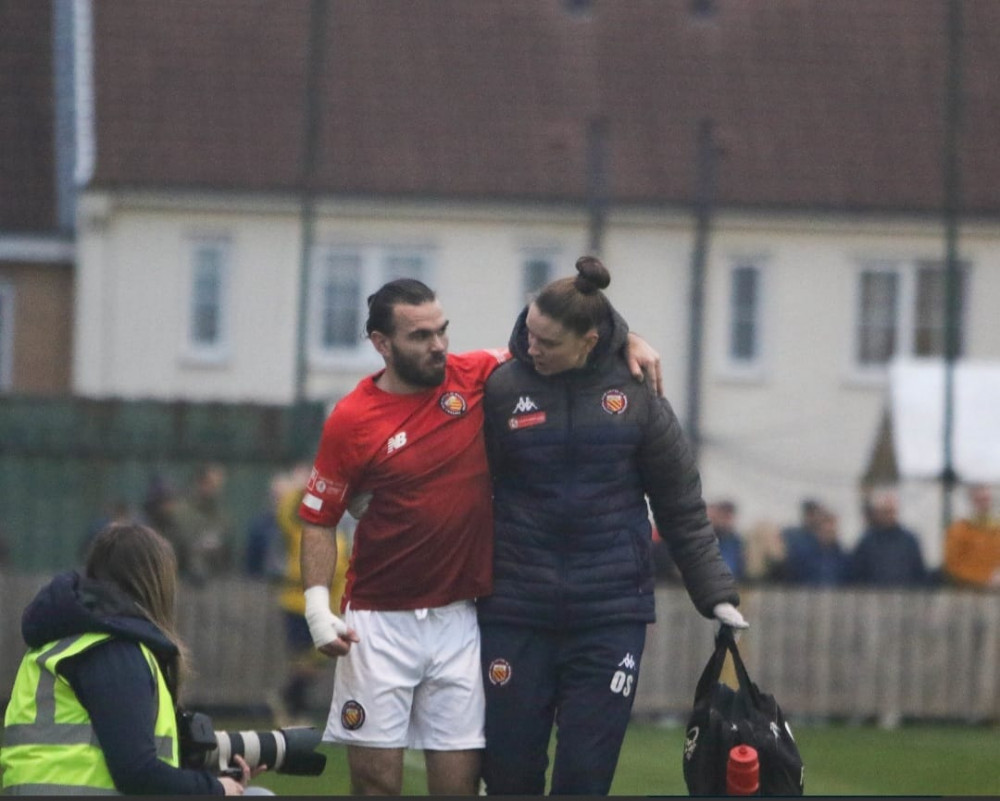We conclude our International Women’s Week spotlight series today by speaking to Olivia Smith, our men’s first team physiotherapist. Liv tells us about her FC United journey and how she made it to where she is now:

“I've been at FC for 6 years now starting off as a volunteer with the women's team, eventually working to make it into a paid position. From there, I progressed up to the academy and then volunteered for the men’s first team for a season, before taking over from Sam Rhoades who taught me a hell of a lot in terms of being a non-league football physio! I have been with the men’s first team for 4 seasons now and I will never get bored of it! I feel so lucky to be able to call it my job!”
Liv speaks about her experience being a female physio in men’s non-league football:
“In my experience, there aren’t a lot of female physios within this league. There are a few, but it is still very much a male dominated area. However, one positive would be that women are increasing in numbers in and around football clubs. I feel really lucky to work with FC as I’ve never found my gender to be an issue. I have been part of football since I was 8 years old playing for my local team, so I know football pretty well and the environment in which it entails, so in that respect I’m lucky. However for others it may not have been as smooth of a transition into this role in non-league men’s football. I feel really proud to be the first female head of medical and lead sports rehabilitator at the club!”
She continues by talking about some of the challenges that she faces and how she is able to stay professional throughout:
“In terms of changing room banter, I’m accustomed to it and take part in some banter with the lads of course! When I look back at my younger days when I was starting out, I’d get the classic: ‘oh love, I’ve got a tight groin’ etc but I had to be professional in that situation and say that it’s not acceptable. Now I’m more experienced and I’ve been at FC for years, I feel like I have the trust of the manager, backroom staff and players, and this really changes the dynamic. They tend to be more protecting and respectful towards me which is really nice to see. I feel like a valued member of the team amongst the players and staff!”
Liv talks about her day-to-day role and the high standards she sets and maintains:
“On matchdays, I tend to always to a pre-match worst case scenario with the opposition physio and what the protocols would be for this. As it’s a male dominated sport, sometimes they can be taken aback from what I expect on a matchday, especially from other teams”
She continues by discussing some of the differences she sees for females holding her role, both positive and negative:
“I think females in a male dominated sport definitely bring a different perspective which is hard to explain. In general, I see the wider picture eg family life and other commitments, and can sympathise with that. It can be difficult at times, especially at this level where time is limited anyway.
I have never experienced much sexism other than the typical match day shouts of ‘ah get him up, he just wants a cuddle!’ etc. Like I said, I’ve been part of football most of my life, so a little banter or light abuse from opposition fans isn’t something that bothers me, I’ll often throw a comment back at them rather than take offence! But generally I don’t hear too much of it, as most of the time I’m focused on the player and doing my job. However, I do know that others are not so fortunate and have had sexist abuse directed at them which isn’t nice to hear or see. At the end of the day, we are all someone’s partner, mother, daughter etc, so I hope this kind of sexism is something we see less of in the future, and I hope it doesn’t deter other females from wanting to pursue this as a career”
Liv concludes by sharing her hopes for the future:
“It is very encouraging to see more and more females emerging into the semi-pro setting, this can only be a positive thing. My message to any females thinking about a career in physiotherapy with a male team: I’d say it can be difficult to start with, but it is more than worth the work and effort to know you are helping people to enjoy playing their sport to their full ability and maximum performance. That is the most rewarding part!”